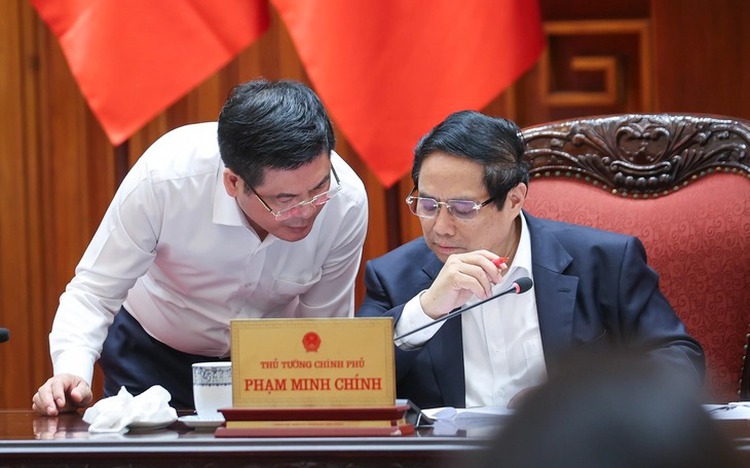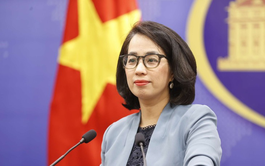
Vietnamese Prime Minister Pham Minh Chinh (R) exchanges information with Minister of Industry and Trade Nguyen Hong Dien during a meeting in Hanoi on April 10, 2025, convened in response to the U.S.'s 46-percent reciprocal tariff on Vietnamese imports. Photo: Vietnam Government Portal
This tariff is part of the U.S.'s new global tariff policy announced on April 3.
PM Chinh's directive was issued during a meeting in Hanoi on addressing the reciprocal tariff, stabilizing the macroeconomy, boosting growth, controlling inflation, and alleviating challenges faced by businesses and citizens.
The prime minister appointed Minister of Industry and Trade Nguyen Hong Dien as head of the negotiation team, tasking him with preparing appropriate plans and scenarios for the negotiations, focusing on safeguarding national interests while ensuring balanced benefits and shared risks between the two sides.
This initiative follows U.S. President Donald Trump's announcement on April 9 of a 90-day delay in implementing the new global tariff policy, which includes the 46-percent tariff on Vietnamese imports, initially set to take effect on the same day.
Vietnam, which had previously requested the U.S. to postpone the reciprocal tariff for at least 45 days to facilitate trade negotiations, is now among over 75 countries and territories that have benefited from the tariff delay.
President Trump explained that these partners have sought trade discussions with the U.S. and have not engaged in significant retaliatory measures.
Vietnam's tariff response plan
In this context, the PM directed the establishment of the negotiation team by April 11 and noted that the tariff negotiations should not adversely affect the 17 free trade agreements Vietnam has signed with over 60 markets worldwide.
He emphasized that dealings with one partner should not negatively impact relationships with others.
The government leader also highlighted this as an opportunity to restructure the economy toward green, digital, and circular development, aiming for rapid yet sustainable growth.
This includes restructuring enterprises, promoting science and technology, fostering innovation, and attracting high-quality investments.
PM Chinh urged relevant agencies to adequately and satisfactorily address U.S. trade concerns, particularly regarding product origin, non-tariff barriers, and intellectual property rights.
Besides, Vietnam should continue opening its market to other partners and regions, actively engaging in trade with countries, including the U.S., especially in sectors like aviation and liquefied natural gas.
He directed the Ministries of Industry and Trade, Finance, and Foreign Affairs to continue consulting international partners on the U.S.'s reciprocal tariff issue, ensuring Vietnam fulfills its commitments to other countries and prevents trade fraud.
Chinh stressed the importance of closely monitoring the current complex situation and promptly proposing and implementing policies.
He insisted on maintaining domestic stability, public confidence, investor assurance, political stability, and social order and safety.
Previously, Deputy Prime Minister Ho Duc Phoc, serving as a special envoy of Party General Secretary To Lam, met with U.S. Trade Representative Jamieson Greer in Washington, D.C., on Wednesday to discuss bilateral trade relations and reciprocal tariffs.
During their meeting, both sides agreed to initiate negotiations on a reciprocal trade agreement, including tax arrangements, and concurred that technical teams from both countries would commence discussions immediately.



Max: 1500 characters
There are no comments yet. Be the first to comment.